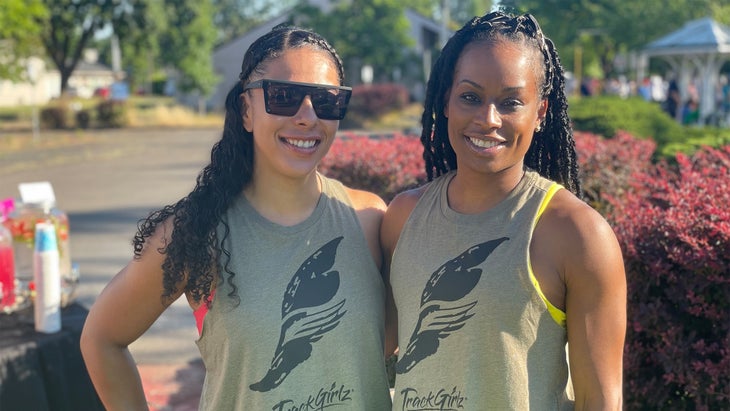Products You May Like
Get access to everything we publish when you
sign up for Outside+.
Imagine a middle-school girl who wants to run track but faces barriers. Perhaps her school lacks a team, and club membership fees—not to mention shoes—are too costly for her family. At a time of life when she most needs support, she’s shut out from the sport, and its benefits and opportunities.
Now, contemplate what her future might look like if, instead, she scored a brand-new pair of spikes and joined a club with funds for uniforms and travel. What if she also attended a camp (in person or virtually) with other young athletes, led by Olympic-caliber mentors and coaches? Then, scrolling her social media feed, she saw inspiring stories of women who look like her, achieving greatness both on the track and off it.
Welcome to the world of TrackGirlz, a fast-growing nonprofit improving girls’ access to the life-changing possibilities of track and field.
Through grants, workshops, and storytelling, 2008 Olympian Mechelle Lewis Freeman and former University of Washington sprinter Jennifer Nash Forrester encourage and educate the next generation. At the same time, they’re shining light on the stories of athletes, present and past, who tend to be overlooked by the broader running community.
“We live in a world where women in track and field often don’t get credit for the impact we’ve given to sport and culture,” Freeman says. “The vision of the non-profit is really to expose and demonstrate that, while empowering girls.”
The idea for TrackGirlz came when, after competing in Beijing in the 4×100 meter relay, Freeman was working at a marketing agency. She asked why no track and field stars were among the athletes on the company’s roster. A colleague told her they were only relevant every four years, around the Olympics.
“I found that pretty shocking, to say the least,” Freeman says. After all, more middle- and high-school girls participate in track and field than any other sport. And she knew its icons—think Flo-Jo and Jackie Joyner-Kersee—inspired, motivated, and shaped popular culture.
So, Freeman went to work, trademarking the term TrackGirlz and starting an LLC. “I’ve been called a track girl since I was 14,” she says. “The community already existed; I just wanted to breathe life into it.” She began selling apparel—hoping to stake a claim for track style in the emerging athleisure industry—and organizing camps for young athletes.
Freeman found Forrester, a wellness coach and fitness professional, on Instagram and asked her to lead a track-inspired workout at an Arizona camp. The two became fast friends and trusted collaborators. When Freeman decided, in 2018, to convert TrackGirlz into a 501(c)3, Forrester signed on as co-director.

The focus on service was always there, Freeman says. Nonprofit status meant they could seek grants, allow sponsors to write off donations, then pour those resources directly into local communities and young athletes.
The transition was already bearing fruit, and the pandemic provided an unanticipated boost. With other projects on pause, Freeman and Forrester devoted even more time to the organization. They booked virtual interviews with high-profile track girls—think Netflix chief marketing officer Bozoma Saint John and former Miss USA Cheslie Kryst, along with Olympic medalists, such as Dawn Harper Nelson and Tianna Bartoletta—and hosted Zoom workshops.
And when Ahmaud Arbery and George Floyd’s murders sparked a conversation about racial justice both inside and outside the running community, even more people tuned in. “When attention came to minority organizations, we were ready for it, because we had been living and breathing this work,” Freeman says.
From 2020 to 2021, TrackGirlz’ social media following grew by a factor of six, collaborations flourished (apparel brand JackRabbit, for instance, gave them $25,000 to redistribute in grants), and Freeman and Forrester committed even more boldly to their vision. “We’re definitely diving in headfirst and taking up space, unapologetically not asking for permission, saying yes to ourselves,” Forrester says.
Ambitious 2021 projects included a 100- and 200-meter street race for middle and high school girls in conjunction with the U.S. Olympic Trials; winners got free tickets to watch the elites compete. TrackGirlz also produced Tokyo Dreamz, a 16-minute documentary featuring shot putter and Olympic silver medalist Raven Saunders. And in May, they held a virtual discussion with members of the historic Tennessee State University women’s track team, the Tigerbelles.
Freeman also went back to the Olympics, this time as an assistant relay coach for USA Track & Field. TrackGirlz has also become a go-to source for news and context about competitors and events. So in between her duties as coach, Freeman was texting updates and photos back to her team stateside, “trying to win medals and be a media company,” she says.
Indeed, it’s a lot for a small team. But heading into a year in which eyes will once again be on the sport, with the world championships on U.S. soil for the first time, Freeman and Forrester have no plans of scaling back. Rather, they hope to hire a director with non-profit experience to support them as they continue to proclaim track and field’s ongoing relevance.
“We want to continue to create that space where stories can be told and girls can have support,” Forrester says. “Things are changing. Women are really at the forefront. And it’s time everyone starts to recognize the potential that can happen through an organization like ours.”
This profile was first published in the Winter 2022 print issue of Women’s Running as part of “Women Who Lead: Power Women of 2022,” which celebrates 15 women who are reshaping the running industry for the better. You can see the full list of honorees here.
